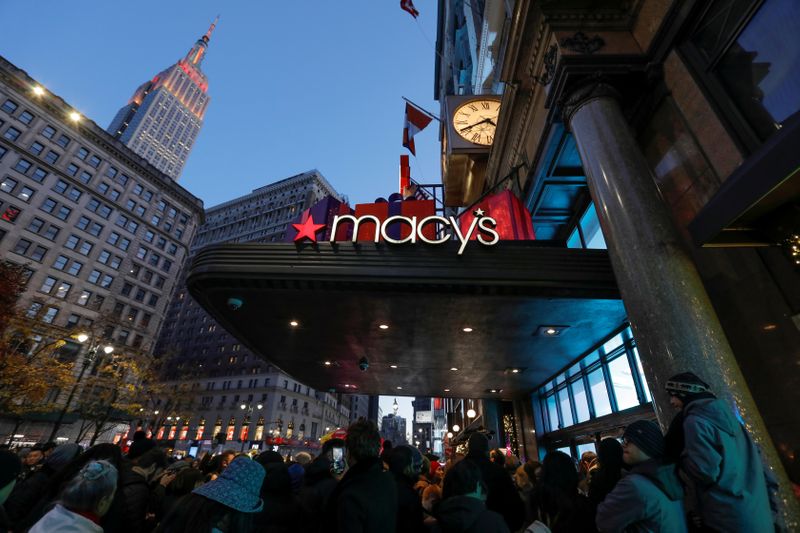This post was originally published on this site
https://i-invdn-com.akamaized.net/trkd-images/LYNXNPEG3A0IJ_L.jpg
NEW YORK (Reuters) – Macy’s Inc (N:M) has hired investment bank Lazard Ltd (N:LAZ) to explore options for bolstering its finances after the department store operator lost most of its revenue as it shut down all its stores as a result of the coronavirus outbreak, people familiar with the matter said.
The move by Macy’s, the largest U.S. department store operator by sales, is a sign of the severity of the crisis facing brick-and-mortar retailers, which were already struggling with the shift to online shopping. The pandemic has forced store closures and widespread furloughs of employees as state after state issued shelter-in-place orders in efforts to contain the spread of the coronavirus, which causes the COVID-19 respiratory illness.
Macy’s has called in Lazard bankers who specialize in finding ways to recapitalize financially troubled companies and rework debts, the sources said. Macy’s has also enlisted debt restructuring lawyers at Kirkland & Ellis LLP, two of the sources said.
Macy’s has asked its advisers to help manage its liabilities and explore options that could include new financing, the sources said, adding that no debt restructuring is imminent.
The sources asked not to be identified because the deliberations are confidential.
A spokeswoman for Macy’s said in a statement that the company is “exploring numerous options to strengthen our capital structure,” adding that it maintains relationships with a range of advisers.
The company, which operates the Macy’s and Bloomingdale’s department stores, declined to comment further beyond pointing to previous steps it has taken in response to the pandemic, which include suspending its quarterly dividend, drawing down its credit line, deferring spending, reducing pay at most management levels and furloughing the majority of its roughly 123,000 employees.
A Kirkland spokeswoman did not immediately respond to a request for comment. A Lazard spokeswoman declined to comment.
The company, which also operates the bluemercury beauty products and spa chain, has $3.6 billion in long-term debt and roughly $7 billion in store lease obligations. It had $685 million in cash as of the end of its most recent fiscal year, and recently drew down another $1.5 billion from a credit line while its stores remained closed.
Macy’s decision to explore new financing, among other options, makes it the latest U.S. retailer to do so. On Thursday, rival Nordstrom Inc (N:JWN) raised $600 million by placing real estate assets that included five stores, six distribution centers and its Seattle headquarters in a separate company and borrowing against it by issuing bonds.
Macy’s was already in the midst of slashing costs before the coronavirus outbreak, with plans to permanently close 125 stores over the next three years and cut more than 2,000 jobs. Those were in addition to the more than 100 store closures and thousands of job cuts it has rolled out since 2015.
The 161-year-old department store operator closed all of its 775 department stores last month in response to the pandemic. That made its e-commerce operations its only source of revenue; e-commerce accounted for about 25% of its roughly $25 billion in sales in the 12 months ending Feb. 1.
It is unclear when Macy’s and other department store chains will be able to re-open their stores. Credit ratings firm Fitch Ratings Inc said earlier this month that it expected Macy’s revenue to plunge nearly 25% this year. The New York-based company’s shares have tumbled more than 60% since the start of this year, giving the retailer a market capitalization of roughly $2 billion.
DEBT DUE
Like many companies hit hard by the pandemic, Macy’s has said its chief executive, Jeff Gennette, will forego pay during the crisis. Last week, Macy’s announced that its chief financial officer had decided to step down at the end of May and that it was seeking a replacement.
Macy’s became a U.S. household name over the decades, known for its Thanksgiving Day Parade in New York City and its flagship Herald Square (NYSE:SQ) store, which stretches over an entire block in the heart of Manhattan.
Macy’s has $530 million of debt due in January 2021 and another $450 million at the start of 2022, and likely has enough cash to make those payments, Fitch said.
The company’s credit rating was downgraded to junk by two ratings firms in recent weeks, making it more expensive for the retailer to borrow. However, Macy’s junk-rated bonds rallied last week after the Federal Reserve said it would expand its asset-buying program to bonds of companies that had been investment-grade but then were downgraded to junk status.
(This story has been refiled to correct headquarters to New York, not Cincinnati in 5th to last paragraph)

